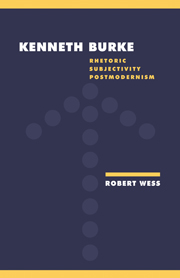Crossref Citations
This Book has been
cited by the following publications. This list is generated based on data provided by Crossref.
Crable, Bryan
1998.
Ideology as “metabiology”: Rereading Burke'sPermanence and Change.
Quarterly Journal of Speech,
Vol. 84,
Issue. 3,
p.
303.
Knapp, Stan J.
1999.
Analyzing Narratives of Expertise: Toward the Development of a Burkeian Pentadic Scheme.
The Sociological Quarterly,
Vol. 40,
Issue. 4,
p.
587.
Desilet, Gregory
1999.
Physics and language—science and rhetoric: Reviewing the parallel evolution of theory on motion and meaning in the aftermath of the Sokal Hoax.
Quarterly Journal of Speech,
Vol. 85,
Issue. 4,
p.
339.
Goodheart, Eugene
2000.
The Cambridge History of Literary Criticism.
p.
248.
Litz, A. Walton
Menand, Louis
and
Rainey, Lawrence
2000.
The Cambridge History of Literary Criticism.
Crable, Bryan
2000.
“Burke's perspective on perspectives: Grounding dramatism in the representative anecdote”.
Quarterly Journal of Speech,
Vol. 86,
Issue. 3,
p.
318.
Anderson, Floyd D.
and
Prelli, Lawrence J.
2001.
Pentadic cartography: Mapping the universe of discourse.
Quarterly Journal of Speech,
Vol. 87,
Issue. 1,
p.
73.
McConachie, Bruce
2002.
Using cognitive science to understand spatiality and community in the theater.
Contemporary Theatre Review,
Vol. 12,
Issue. 3,
p.
97.
George, Ann
and
Selzer, Jack
2003.
What happened at the first American writers’ congress? Kenneth Burke's “revolutionary symbolism in America”.
Rhetoric Society Quarterly,
Vol. 33,
Issue. 2,
p.
47.
Crable, Bryan
2003.
Symbolizing Motion: Burke's Dialectic and Rhetoric of the Body.
Rhetoric Review,
Vol. 22,
Issue. 2,
p.
121.
Hawhee, Debra
2004.
Burke on Drugs.
Rhetoric Society Quarterly,
Vol. 34,
Issue. 1,
p.
5.
Tell, David
2004.
Burke's encounter with ransom: Rhetoric and epistemology in “four master tropes”.
Rhetoric Society Quarterly,
Vol. 34,
Issue. 4,
p.
33.
Simons, Herbert W.
2004.
A Companion to Rhetoric and Rhetorical Criticism.
p.
152.
Blain, Michael
2005.
The politics of victimage:.
Critical Discourse Studies,
Vol. 2,
Issue. 1,
p.
31.
Drucker, Susan J.
2005.
Legal Communication: A Review in Search of a Field.
Review of Communication,
Vol. 5,
Issue. 1,
p.
12.
Longaker, Mark Garrett
2005.
Market Rhetoric and the Ebonics Debate.
Written Communication,
Vol. 22,
Issue. 4,
p.
472.
Millei, Zsuzsanna J.
2005.
The Discourse of Control: Disruption and Foucault in an Early Childhood Classroom.
Contemporary Issues in Early Childhood,
Vol. 6,
Issue. 2,
p.
128.
Williams, Mark T.
2005.
Ordering Rhetorical Contexts with Burke's Terms for Order.
Rhetoric Review,
Vol. 24,
Issue. 2,
p.
170.
2006.
Specters of Mother India.
p.
1.
2006.
Specters of Mother India.
p.
197.



